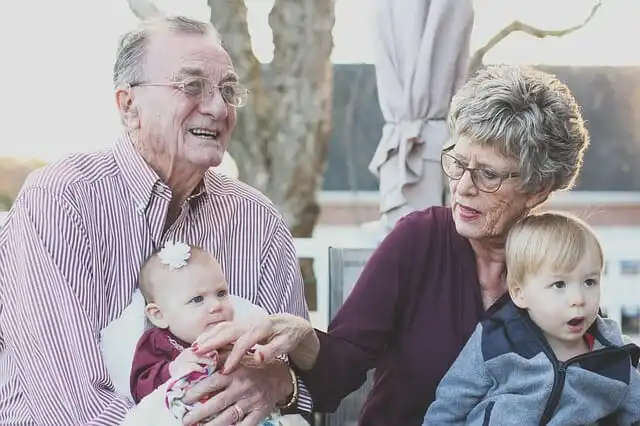
When Grandparents Interfere in Positive Parenting
Her brain is withering from that technology, your father says as your daughter is savoring her one-hour daily screen time.
Your mother's voice threatens, "I would have washed your mouth out with soap," when your kid answers back to you.
Parenting is difficult enough; it is even more difficult when our parents—now grandparents—offer unwelcome counsel.
Actually, parents never stop being parents when their children grow up—not least since they advance to grandparents.
Usually, grandparents want to share with us real, hard-earned experiences they have had. Having having reared a kid or more for themselves, their views are hardly anything to minimize.
But, just because our parents and in-laws care about their grandkids and want to be engaged in our life does not imply they have the right to interfere with the way we raise our children.
1. Clearly State Your Parenting Goals
-
When one does not get to the core of their intentions, people in any relationship run the danger of misinterpretation. That’s why having a true talk with grandparents about our parenting choices is vital.
-
Grandparents could see positive parenting at odds with the way they were raised (or the way they raised us). Part of that, though, results from misinterpretation.
-
Maybe your parents or in-laws don’t aware you’ve purposely offered your eight-year-old the choice to wear a coat on a 40-degree day or suffer the inevitable consequence of being chilly at the bus stop. They only see a youngster refusing to put on another layer and your lack of an ultimatum.
-
They may not understand that your objective is to raise kids who are independently driven by their own choices–and that you disagree that turning to power struggles or relying on conventional forms of punishment, like spanking, would foster improved conduct.
Distinguish Between Consequences and Punishment

Consequences differ from more traditional parenting tactics, including punishment. In positive parenting, consequences are a sort of discipline that allows life be the teacher. They employ successful approaches to educate a youngster how to make positive choices and learn from their errors in a friendly and supportive way.
What’s wrong with punishment? Plenty–and that’s why it’s not very helpful in achieving the conduct we desire from our kids.
While discipline is proactive, punishment is reactive. Punishment seeks to make youngsters suffer from their mistakes or poor choices–with the goal that they won’t make those same decisions in the future. However, data reveals that these measures, like spanking and time-outs, merely put the youngster on the defensive.
However, natural and logical consequences, when applied effectively, enable youngsters to make great decisions and/or handle the outcomes of unfavorable ones.
Natural and logical consequences, when they follow the 5 Rs of successful consequences, are meant to educate cause and effect without excessive, unneeded penalties; especially when punishment instigates grudges against parents and feeds power conflicts.
2. Remind Grandparents That Parenting is Not One-Size-Fits-All
-
Grandparents who feel forced to intervene with parenting realize that the world looks different nowadays. In fact, it might worry and terrify them.
-
But, it’s because the world is different that parenting practices have been pushed to develop. Technology, media, and less authoritarian parenting have grown prominent in children’s lives. They determine our society and, consequently, our parental reactions.
-
So, while grandparents may feel the need to double down on the strategies they grew up with, it’s useful to point out that many of those ways are now null and invalid. If you actually scrubbed your child’s mouth out with soap, you may get a visit from Child Protective Services!
-
New diagnoses are also coming to light, which are helping detect and treat diverse learning, attention, and sensory abnormalities. Many of these distinctions were undetected in prior generations; rather, they were brushed aside. Helping children overcome these obstacles needs understanding and adaptations in both parenting and grandparenting.
-
Parenting also appears vary from family to family. We all have to employ tactics that work for our kids, and no two kids–even siblings–are the same!
-
While you may argue there are certain timeless parenting practices, most parenting must stay adaptive and changeable.
3. Consider the Grandparent’s Perspective
-
Having a discussion works both ways. If we’re telling our side of the parenting narrative, we should be ready for the grandparents’ comments.
-
Before you get defensive, imagine yourself in their position. One day, fate willing, you’ll be seated in their seats. Your kids, whom you love more than everything, will be grown and gone and have children of their own. You’ll want to assist them just as much as your parents want to help you today!
-
Lend an ear here and there to grandparents’ worries, and try not to take things personally. They may have solid ideas, and at the absolute least, they give a fresh perspective. Keeping an open mind is key to parenting.
-
But, if grandparents become pushy and continuously disrespect your parenting ideals, feel free to accept their counsel with a grain of salt. You are the parent, and you make the ultimate decisions!
-
In actuality, your parenting has little to do with your parents. This isn’t out of disrespect; the objective of parenting isn’t to accept or reject the way your parents raised you. It’s just finding out the best approach to raise your child.
-
Regardless, your parents can’t alter who they are. It is unjust to ask them to do so. But, kids can learn to step back and follow your direction.
Read Also: Positive Parenting Techniques You Can Use
4. Be Grateful for Your Parent’s Involvement, But Say, “I’ve Got This”

-
If your parents are active in your family, it implies they care.
-
Still, parents have to progressively let go of directing their children’s life if they want to preserve a good, healthy connection with us–including long into adulthood and parenting.
-
Granted, we all make errors as parents. We don’t always know what we’re doing. It’s good to admit that freely!
-
But, we know our children better than anyone and are parenting them in the way we think is best. Nothing more can be anticipated.
-
And, to be sure, you can’t raise your children the identical way your parents raised you. Not only has society changed, but you are an altogether different person.
-
When faced with a grandparent’s criticism, you can say:
-
“Thank you for loving the kids and me so much and wanting the best for us. I just have to parent them my way. It will assist enormously if you can trust me. The greatest way to assist me and stay connected is as my back-up.”
5. Use Guidelines When Grandparents Babysit
-
The joys of grandparenting are legendary, and youngsters adore their grandparents. But when grandparents come or babysit, expectations might be fulfilled or miscommunicated–or both.
-
Grandparents, for example, may wonder:
- Why don’t the kids usually play outside?
- Is that truly the way youngsters communicate to their parents these days?
- Why can’t I provide cookies as a lunchtime treat?
-
While tolerance with family and home guests is usually useful, grandparents may have habits that put a kink in our disciplinary strategies or routines. So, just as it’s useful to share our overarching parenting beliefs with grandparents, it’s also beneficial to go over particular family details.
-
This is especially beneficial when grandparents don’t live close and come just periodically. They will be farther distanced from our daily lives and expectations.
-
When grandparents babysit, guidelines are immensely useful: especially those that follow a regimen.
-
With a well-oiled schedule, grandparents may sneak in and comfortably plan ahead. They know when kids will wake up, what they like to eat for breakfast, when they go to school, take naps, and so on. A lot less can go bad and be left to chance with a strong strategy in place.
-
Alternatively, when grandparents are left scurrying, and youngsters aren’t sure how to react, behavior can swiftly disintegrate.
-
Regardless, when grandparents are in the capacity of frequent caregivers, it may require them to follow through on punishment. If you want your parents to utilize repercussions associated to effective parenting, you’ll have to explain exactly how to do so and what they involve. It helps to have previously had a comprehensive chat with them or to schedule time for the conversation before you depart.
Final Thoughts
Despite a heart-to-heart that would make any counselor drool, you and your parents/in-laws still may not see eye-to-eye. If so, it’s fair to feel dissatisfied and upset. But try not to get disheartened! Politely, preserve your commitment.
As you stay dedicated to positive parenting, you will begin to notice your child’s behaviors change, and grandparents will see it too. They may even be the first to recognize and commend your tactics.
But if not, just remember: families can lovingly agree to disagree.


